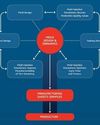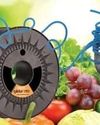THE USAGE OF GEO SYNTHETICS HAS ENHANCED LIFE SPAN, STRENGTH AND EFFICIENCIES OF THE PROJECTS, AT THE SAME TIME REDUCING MAINTENANCE COSTS.

Reliance Industries Ltd. (RIL) is focusing on playing a key role in making India’s infrastructure development sustainable by providing stronger and more durable - polymers, especially polypropylene (PP) based solutions.
To aligning with the Indian government’s thrust on development of sustainable infrastructure in the country, RIL’s research and development team has intensified efforts in developing the newer polymer based applications and optimising existing. The team at RIL is also working to meet the anticipated needs in the areas of road, rail, river, garbage management and canal development as the government is currently putting in painstaking hard work in strengthening guidelines, codes and standards for sustainable development of infrastructure.
Buoyed by the outstanding results of pilot projects in the areas of road, rail and river development projects, the government has increased its thrust on adopting geo-synthetic’s usage in the construction of these infrastructures. The usage of geo synthetics has enhanced life span, strength and efficiencies of the projects, at the same time reducing maintenance costs.
The lucrativeness of the opportunities can be assessed from the significant profit margins the businesses are generating. The profit margins are in the top quartile among the polymer processing industry.
In India, the usage of geo-synthetics such as non-woven geotextile, pp bi-axial and multi axial geo-grids is at the nascent stage in infrastructure projects, unlike its counterparts in developed countries like, the US, Australia and the continent of Europe, where geo-synthetics are used for many years to make stronger rail, road, pond lining and canal lining projects at lower lifecycle costs.
This story is from the April - May 2019 edition of ET Polymers.
Start your 7-day Magzter GOLD free trial to access thousands of curated premium stories, and 9,000+ magazines and newspapers.
Already a subscriber ? Sign In
This story is from the April - May 2019 edition of ET Polymers.
Start your 7-day Magzter GOLD free trial to access thousands of curated premium stories, and 9,000+ magazines and newspapers.
Already a subscriber? Sign In

The Changing Face Of Mobility
A brief look at the salient points on how plastics is transforming automotive manufacturing

Nippon Launches Weatherbond PRO
Nippon Paint (India) Private Limited (Decorative Division) Asia’s leading paint manufacturer launched the advertising campaign for Weatherbond PRO – the high durable exterior emulsion offering up to 15 years of protection against extreme climate conditions like prolonged exposure to heat, and heavy spells of rain. Based on extensive research done by Nippon Paint’s R&D team, this product was developed for customers who need advance protection for their home exteriors in terms of extended fresh look, strong waterproofing and protection from Algal and Fungal attacks.

Low-Pressure Molding Adopted Across Industries
Henkel’s Technomelt Low-Pressure Molding technology meets demands for encapsulation of electronics and medical components

TotalEnergies and Jindal Films To introduce Certified Circular Polypropylene
TotalEnergies and Jindal Films have joined forces to produce more sustainable flexible food packaging and labels. Using advanced recycling technology from Plastic Energy, TotalEnergies will supply Jindal Films with Certified Circular Polypropylene produced from postconsumer plastic waste. This new value-chain collaboration will divert plastic waste currently destined for incineration and landfill because it is too complex to recycle through existing schemes.

Lenzing's VEOCEL™ Brand Launches Hydrophobic Lyocell Fibres With Dry Technology
In its quest to drive greater sustainability in the personal care and hygiene industry, the VEOCEL™ brand has launched a new offering: VEOCEL™ branded lyocell fibres with dry technology which are naturally smooth and gentle on skin, ensuring comfort for sensitive skin. Absorbent hygiene products are an indispensable part of many consumers’ lives and are relied upon daily. As these are essential items, it is important that they should offer maximum comfort and relief to the user. This is demonstrated by the new VEOCEL™ branded lyocell fibres which have the capacity to provide a high level of comfort, softness and dryness, when applied in these types of products.

Simulating Injection Molding for Efficiency
Producing high-quality, plastic injection-moulded parts more quickly and cost-effectively has become a critical factor for manufacturing success in today’s global market. Instead of engaging in slow, expensive prototype iterations and test cycles to satisfy manufacturing requirements, designers, mold makers, and manufacturing professionals can leverage SOLIDWORKS® Plastics mold-filling simulation software to optimise parts for manufacturability, refine tooling to improve quality and shorten cycle times to reduce manufacturing costs

Leveraging 3D Printing for optimised Injection Molds
A guideline from Formlabs on the factors to consider before using stereolithography (SLA) 3D printed molds in the injection molding process to lower costs, reduce lead times, and bring better products to market

iglidur I151 for FDA-compliant, Detectable, Wear Resistant Parts In Food Technology
igus has developed a blue, food-compatible tribo-filament for cost effective 3D printing of special parts. iglidur I151 is blue, prints easily, and has an optimal coefficient of friction and wear. The new tribo-filament is a refinement of the easy-to-machine igus iglidur I150 all-rounder filament. Because it is blue, it can be used to manufacture special parts that are optically detectable in the food industry. Food compatibility according to the FDA and to EU Regulation 10/2011 also qualifies the high-performance polymer for use in the food and cosmetics industries.

Exceptional Warpage Control
SABIC’s new LNP™ THERMOCOMP™ compounds deliver exceptional warpage control

Digital Transformation in Plastics
Automation in the plastics industry is becoming more complex, the pace of innovation is accelerating, and competitive pressure is increasing. Open and safe automation makes it possible to combine traditional mechanical engineering with the latest Industry 4.0 technologies – Lets take a look at how Industry 4.0 is transforming the plastics sector